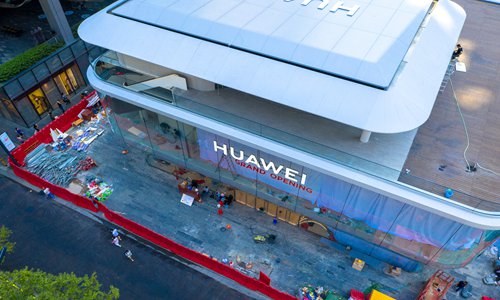HOME >> BUSINESS
Mutual fair market access key to Sino-Indian ties
By Hu Weijia Source:Global Times Published: 2019/10/10 22:04:20

Photo: VCG
Chinese telecom equipment maker Huawei has once again attracted public attention ahead of this week's Sino-Indian informal summit.
We appreciate the efforts by the Indian government to allow Huawei to participate in the 5G use case demonstrations during the India Mobile Congress (IMC) that begins in New Delhi next week. The more India opens its mind to Huawei, the more it will get in return.
China on Wednesday announced its first list of 33 generic medicines, encouraging pharmaceutical companies to develop and produce them. Earlier this year, China revised its drug laws to reduce penalties for the sale of unapproved drugs and reduce restrictions on imports of generic drugs, especially from India. New Delhi's final decision on Huawei will be rewarded when more Indian enterprises, pharmaceutical companies included, achieve success in the Chinese market.
Since the first informal summit between China and India held in Wuhan, Central China's Hubei Province last year, China-India relations have been on an upward trajectory. The upcoming summit is expected to promote bilateral relations between the two emerging economies. We believe ties are mature enough to see that economic and political differences between the two countries are properly managed.
Although India allowed Huawei to participate in the 5G use case demonstrations, the Indian government has not yet taken any final decision on Huawei's participation in India's upcoming 5G trials, the Times of India reported. That will be the next test faced by the Indian government.
Indian officials have repeatedly stressed that the two countries need to respect one another's core concerns and manage their differences. The Chinese side agrees. Fair treatment of Chinese enterprises is a core issue, and without resolving it Indian companies can hardly share the dividends of China's increasing consumption power. This means that India cannot reverse its trade deficit with China. The two countries will end in a lose-lose situation.
China's growth and India's global economic and geopolitical influence have enhanced the significance of their bilateral ties. India can only successfully develop a sound relationship with China if it can put aside voices from Washington and think independently about China-India relations.
The US has put pressure on New Delhi to act against Huawei. We hope India can make an independent decision on Huawei's participation in India's 5G market and ensure the Chinese company receives fair treatment.
India has the world's second-largest telecom market in terms of its subscriber base. Chinese telecom companies cannot afford a failure in this emerging market. With India's economic rise, China-India relations are likely to give more priority to safeguarding the legitimate rights of each other's companies in their respective markets. China will further open up its domestic market and ensure fair treatment for Indian enterprises, and it expects to see the same sincerity from New Delhi.
The author is a reporter with the Global Times. bizopinion@globaltimes.com.cn
Posted in: EYE ON ECONOMY